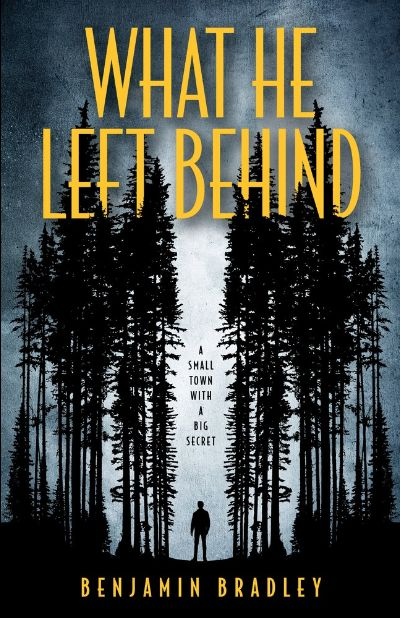A new installment in Trincheri’s mystery series is a call for nothing less than celebration. Retired NYPD detective Nico Doyle, now living in Tuscany, takes it upon himself to investigate a murder that has torn a family apart. A message discreetly deposited in the collar of Nico’s dog (“Please help my babbo”) by Cilia, a seven-year-old girl, piques Nico’s interest. Enough that he decides to take up the investigation and locate Saverio, Cilia’s father, who disappeared after his partner in an electronics store was killed, with Saverio the carabinieri’s number one suspect. Nico starts by questioning some of the local folk and friends in Gravigna, his hometown, but eventually he heads off to the larger, beautiful town of Pitigliano, where the murder took place. Rich in culture, food, wine and—above all else—friendship, this is sure to be loved by fans of cozyish series, gentle police procedurals, and Italia!
Police Procedural
A likable duo is at the center of Broadchurch-creator Chibnall’s debut: detectives Nicola Bridge and her newbie partner, Harry Ward, dubbed Westlife for his boy-band looks and first name. Small-town Fleetcombe, on England’s Dorset coast, is the setting; it’s Nicola’s hometown, and she’s back to separate her husband from an affair, a plot line that creates a realistic undercurrent of desperation that matches the bizarre crime facing the new partners. The naked body of a man is found tied to a chair on a road near town. That’s odd enough in Fleetcombe, where sharp words at the local pubs—one of them the White Hart of the book’s title—are about as violent as it gets. But there’s more: the body has a stag’s antlers affixed to its head, a sinister touch that eager Harry tries to tie to mythology and local history, only to be brought back to earth by his more practical and seasoned colleague. Work the evidence, she says, setting the two on a winding path that creates a solid procedural enjoyably filled with oddball townspeople, personal travails, the inevitable local criminal element, and one very savvy little girl, a character whom readers will want to swoop in and save. This absorbing thriller shows all the hallmarks of having been written by a master of TV drama.
Characters of all sorts and types, many unpleasant at best, fill the pages of this, the 22nd Inspector Lynley novel. There is a complicated scheme to buy the land or mineral rights in an area of Cornwall to mine lithium. The sleazy agent of the mining company finds the murdered body of Michael Lobb, tin craftsman and major holdout to the plan, and thus begins the search…for the weapon, for the motive, for the truth of the matter that forms the rest of the skillfully built puzzle that makes up the book. Bea Hannaford is in charge of the case (old friend Lynley doesn’t show up until much later) and focuses on Kayla, the the very much younger wife of Michael; his ex-wife; and his grown children as suspects. The story is eerily filled in by Michael himself in chapters interspersed with those on on the investigation. Even though all the alleys, many blind, are followed, it is the tiny pieces and astonishing happenstance that bring everything to a factual, reasonable end, with Lindley of course providing wisdom. After all this time, it’s gratifying to see how the author can take this tangled skein of a story and piece it out to a smooth conclusion.
Los Angeles Detective Eve Ronin uses an unorthodox method to stop a robbery while off duty, putting her in the boss’s crosshairs in Goldberg’s (Dream Town, Calico, Malibu Burning, Ashes Never Lie) latest. Eve is torn between her celebrity status from having a TV show based on her “life” and the higher-ups who want her to leave. Even a suspension is temporary when videos of Eve stopping the robbery go viral and a dead body is discovered in a metal drum. Her life and the case escalate when one of the suspects has a vendetta against her. Add corruption inside her own department and a helicopter crash that hits literally too close to home, and she barely has time to breathe. Eve must balance her pursuit of justice and be on her best behavior since one false move could mean the end of her career, even if she’s the most famous detective in Los Angeles. Readers will love Goldberg’s dive into Eve’s world and the quirky aspects of Los Angeles life as well as the continuing story (Goldberg even throws in an extensive cameo featuring featuring his other series characters). Whether Fallen Star is your first time reading Eve or your sixth doesn’t matter. In either case, Goldberg has done it again with a compelling and complex mystery.
A powerful novel that spans generations as it takes us deep into rural western Sweden. It’s the holidays in the winter of 1999, and most people are anxious about little more than where to hide their money before it disappears into Y2K, when the police discover a terrifying accident. A car is found smashed into a tree, leaving behind a bloody steering wheel and the body of a local teen in the trunk. With such a small community, you would think that the secrets would come tumbling out. But no. These people aren’t talkers. Terse and taciturn, both adults and teens remain reserved. Even the new young officer, Siri Bengtsson—who is closely watching two young men as suspects—can’t successfully crack either the families or the teens. Jump ahead 20 years, when there is a similar murder, strange enough to coax Siri out of retirement, and to finally get some of those teens—now adults—talking. Carlsson (Blaze Me a Sun, Under the Storm), who has a doctorate in criminology, is the recipient of several prizes in Scandinavian crime writing. Readers who enjoy his work will also appreciate Liza Marklund, Ragnar Jónasson, and Tana French.
A vacation/honeymoon for Mattie and Cole Walker, along with Cole’s young daughters, quickly goes awry in Mizushima’s (Gathering Mist) latest when the family is out snowshoeing and they hear a scream. Cole and the girls return to the lodge for help, while Mattie stays behind with her K-9 companion, Robo. They see someone hurt, but before they can get there to assist, a rockslide buries the victim, and if it weren’t for quick thinking, Robo would have been buried as well. The investigation proves rocky when Mattie realizes that the victim is someone her family knows; he’s the husband of Cole’s veterinary assistant, Tess. Mattie works with the investigative team for Timber Creek County, and when they start digging, the clues and evidence mount for Tess’s guilt. Isn’t it always the spouse? Mattie doesn’t believe it could be Tess, but the more she tries to prove her friend’s innocence, the more she puts her family in the crosshairs of a dangerous person who is willing to kill again. Mizushima has a terrific series with the Walkers and life in the fictitious Colorado Timber Creek County. Robo, her K-9 assistant, continues to shine. Ten books in, and Mizushima still gets better with every entry.
Oak Hill, NC is a town where nothing much in the way of crime happens. Then, in the space of a few days, there is murder, robbery, and arson. Jacob Sawyer, someone who hasn’t been seen for 15 years, is back in town, though no one thinks he is the cause. Grace Bingham, local police detective and Jacob’s abandoned love interest from before, is under time pressure to solve the crimes without offending anyone important. Jacob’s back because his mother, beloved in the town, is dying of cancer; Calvin Dockery, an extremely wealthy local who pulls all the strings, is also dying. The current crimes harken to unexplained events of the past that caused Jacob to leave. The story moves from the present to the past and back again, gradually revealing what happened. Grace and Jacob are undeterred in their search to connect what is happening now with what happened in the past regardless of who is involved. Money is power, and power is very dangerous here, and those with it are willing to spare no one. Resolution is not easy, but very satisfying in a book with a great deal of atmosphere and local resonance.
Sergeant Stilwell works for the sheriff’s office of Catalina Island, off Los Angeles, a job he was shoved into after an incident on the mainland involving his partner. Police politics and his dogged pursuit of the truth have placed him in a thankless job, but serving a warrant on a suspect in an animal-abuse case quickly turns ugly. When the murder of a young woman who waitressed at a gentlemen’s club puts him in the crosshairs of influential people, not to mention those of his former colleagues, Stilwell can either sit back and let everyone else solve things, or he can go against protocol and orders and pursue justice. Doing the right thing could jeopardize his career and future with a woman he’s fallen in love with on the island. Connelly has created a whole new cast of characters, and just like Bosch and Ballard, Stilwell and the rest are terrific. The case and the story flow nicely, and it wouldn’t be a Michael Connelly novel without a few surprises. His name on the cover guarantees a stellar read, and Nightshade is no exception and hopefully the start of a new series.
June in New Zealand means a chilly winter. But it also marks the rising of the sacred stars known as the Matarike, launching the start of the Māori New Year. “When Matarike rises, it is a time for remembering the dead; a time for saying goodbye. And it is also a time for starting anew.” Like the sacred Matarike celebrations, Bennett’s emotionally charged third Hana Westerman mystery (after Better the Blood and Return to Blood) revolves around a series of transitions, in which beloved characters say goodbye to loved ones and embark on new directions in their lives. Returning from festivities in his ex-wife Hana’s hometown, Detective Inspector Jaye Hamilton stops at an Auckland convenience store to pick up champagne to celebrate his daughter’s engagement when he is shot and seriously wounded by a balaclava-wearing assailant. The getaway car is quickly found and a young Māori man, Toa Davis, is implicated in the crime. But Hana, who has asked to join the investigation as a temporary constable, soon suspects that this was no random assault but a targeted attack. Could it be connected to Jaye’s work as an undercover cop years ago? Māori author Bennett delves deeper into New Zealand’s aboriginal culture (with helpful footnotes translating Māori words) while exploring the deeply embedded racism that the country’s first peoples face. An open-ended conclusion will have fans eagerly awaiting the next installment.
After Scavenger and Standalone, Chambers has brought his DC PI Dickie Cornish back to have his smarts tested and his heart trampled on again. Dickie’s clean after “a mishap in college” (Howard University, no less) saw him living as an addict on the streets and in various flophouses. He’s the kind of guy who lets his cat eat mayo and crumbs off his plate, but can put a tough facade on when he has to. When a way-out-of-his-league former classmate, now Deputy Attorney General of the United States, asks him—with the threat of a murder charge from his past if he says no—to find out who’s supplying lethal drugs to the area, he’s back on the streets, tough attitude in place. Readers are in for a layered mystery here, with Dickie moving between tent cities and the Department of Justice to figure out what’s going on, and with figures from his past reappearing and adding to the puzzle and mayhem. Throughout, the Black PI’s failure to fit in his old haunts and new ones creates an atmospheric tension that’s imparted by Dickie’s inner monologue and realistic dialogue with characters of all kinds. Noir fans, look out.










